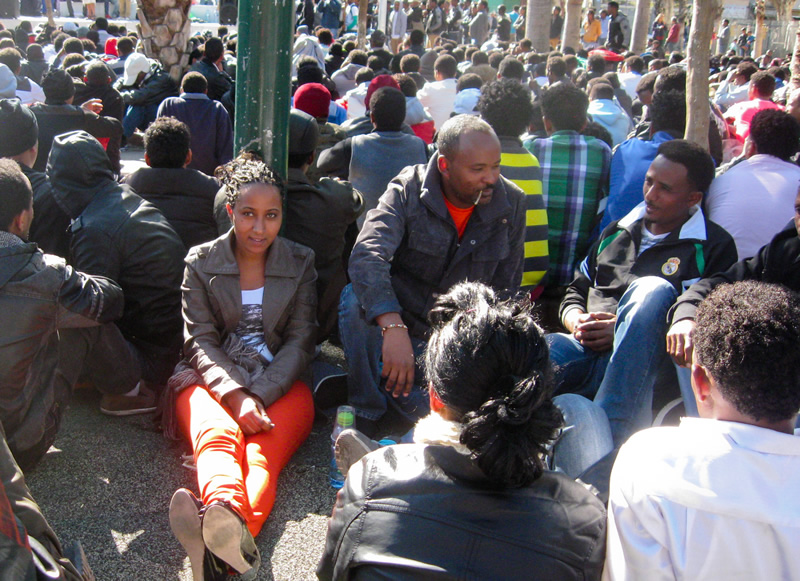Parashat Mishpatim/Shabbat Sh’qalim
Exodus 21:1 – 24:18
After leaving Egypt and receiving the Torah at Mount Sinai we have taken our first giant steps to becoming a people free and responsible for its own identity, charged with forming and running a just society. God’s charge has been to us to become “a kingdom of priests and a holy nation.” (Ex. 19:6) Our Torah portion adds many specifics to what such a society would look like. It is the first Torah portion that is mostly given over to laws rather than to stories. Its very name is “mishpatim – fair judgments.
While most of the rules of the Torah focus on building an Israelite nation, it never loses sight of the fact that we will always be interacting with other people who are not Israelites. These are the “strangers” whose right to fair treatment (and even to love!) merits many mentions in our law code. A couple of those many instances are found in Mishpatim. Each time the Torah commands us to deal fairly and sensitively with the stranger She bases the command on our memory of our own history as strangers in Egypt. Here is one such instance: “You shall not exploit the stranger nor oppress him, for you were strangers in the land of Egypt.” (Ex. 22:20)
The linkage between law and story is firmly established here. We are assumed to remember our own experience as outsiders in another land, and we are told what lessons to draw from such remembered experiences. And, as we have seen during the Exodus story, the Torah goes further and commands us to remember our experience, for it is upon that personal relationship to our story that we can more securely found our pursuit of fellow-feeling and just behavior toward the stranger. This is what it means to be a Jew.
How tragic it is, therefore, to learn that this essential link between our sense of our own history and our sense of morality is fraying badly in our own times! While the Jewish community in the United States struggles with its own questions of where we, as individuals and as a community, should stand in confronting the moral challenges facing American society, that struggle is intensified many times over in the one country where being Jewish conveys the kind of societal power that the Torah dreamed of for us and sought to mold. That place is Israel, the one place on earth where Jews exercise political power as a majority, defining its own society, defined as a Jewish state.
Some of us do not like to hear anyone criticize Israel. Some of us prefer to focus only on the good things we can point to in Israeli reality. But criticizing a government is not treason, despite what some misguided American and Jewish leaders might say. On the contrary, to love one’s people and to wish for it to fulfill its unique mission in history requires an honest view of its moral choices.
One such difficult choice facing Israel is how to deal with thousands of refugees who have fled war and famine and torture in Africa and have been in Israel for years. After dragging its feet for too long, the government has finally decided to expel them all without giving them the chance to plead their cases. There may be reasons to make such a terrible choice – although I reject them. Still, I recognize that some people may come to other conclusions.
But what bothers me deeply is that I would have hoped that our Jewish history and heritage would be a factor in anyone’s thought process about this hard question, whatever their ultimate conclusion about it. So I am deeply saddened to read that: “Asked whether Jews need to show greater generosity to asylum seekers because of their history as a persecuted people, 55 percent of those questioned said they disagree (60 percent of the Jewish respondents and 32 percent of the Arab respondents). Only about a third of the Jewish respondents said they agree.”
Haaretz: Two Out of Three Israelis Support Deportation of African Asylum Seekers, Poll Finds
This finding astounds me and pains me. We are in a very terrible moral state when a majority of Jews feel no call from our own history and from our Torah to find ways to care for the stranger who is in trouble! Instead of Israel presenting the opportunity to finally fulfill God’s vision of becoming a just society, we have used our power to become the same as the lowest example of an uncaring nation.
Nor are we entitled to point a finger at our Israeli brothers and sisters if we do not confront this same issue on our shores, in our country, which is immensely more safe and more richly endowed with resources than is Israel.
Do we remember our past? Do we still care?
Shabbat Shalom
Rabbi David Greenstein
![]()
Subscribe to Rabbi Greenstein’s weekly d’var Torah
image: “African Refugees in Israel” by Rudychaimg in the public domain
- Toby Stein: In Memoriam - Thu, Feb 8, 2024
- Faithfulness and Hope: Parashat Sh’lach - Thu, Jun 23, 2022
- Past Their Prime: Parashat B’ha`a lot’kha - Thu, Jun 16, 2022

